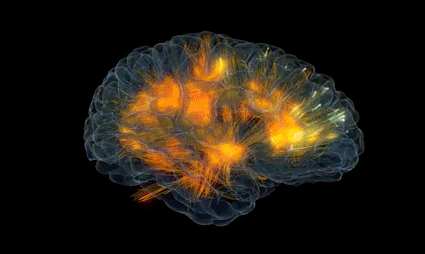That Knot in My Stomach, the Black Hole of My Anxiety


Written and verified by the psychologist Valeria Sabater
Sometimes life sets up shop there in the very center of our body, like a ball that’s sucking up our air. It isn’t butterflies. It’s the all-consuming black hole of anxiety, a familiar enemy. It makes life seem too fast, it makes our hopes fade, and it distorts our priorities.
Experts have spent a lot of time studying the effects of anxiety on our bodies. The findings are simply amazing. In the Johns Hopkins psychiatric department, for example, they discovered that people with generalized anxiety disorder accumulated chronic tension in the muscle located right in the forehead — as well as constant overloads in the gastrocnemius muscles in the calves.
“Anxiety with fear and fear with anxiety contribute to robbing the human being of its most essential qualities. One of them is reflection”
-Konrad Lorenz-
However, the most common and annoying symptoms are in our digestive system: the esophagus, stomach, intestines… Gastrointestinal pain and anxiety are very closely connected. We must remember that our digestive system is “upholstered” by a very complex network of nerve cells, and although this neural network does not emit or produce any thought, it does mediate our moods.
We should remember, for example, that this “second” brain is in charge of regulating the production of serotonin, the so-called happiness hormone. However, another thing that it does is react strongly to stress.
When we go through times of much pressure, anguish, or restlessness, the stomach reacts by releasing adrenocorticotropin, a peptide hormone that also acts as a neurotransmitter.
That is when the pain, the visceral hypersensitivity, the intestinal motility appear… That annoying knot in the stomach where all our problems like to live.

Butterflies and black holes
Marta has two jobs and very little free time. She only sees her 6-year-old son when she gets home and he stays up so his mother can say good night and tuck him in before going to sleep.
Every day he asks her when they can do something together, play together, draw together, go for a walk together… Marta always says on Sunday. “On Sunday we’ll do whatever you want, just wait.” But when the day comes, Marta is so exhausted that she’s unable to get out of bed.
It’s on those Sundays when Marta, in the mess of her sheets, fatigue and despair, she longs for the days when only butterflies lived in her stomach. Before, it was all hope.
Now it’s all black holes, hidden tears, and worries about the bills. The day does not have enough hours… Her stomach is like a ball of knots getting tighter every day…
Anxiety and your brain
Seeing Mart’s little story from the outside, maybe you think that the solution is simple: to get organized, to leave her job or to find a better job that allows her to have more quality time with her child.
However, when we suffer from anxiety our decision making does not work the same. That mechanism in our brain fails completely.

Decision making is a very fine-tuned cognitive process that requires weighing risks, assessing rewards and analyzing the relationship between our actions and their consequences. When someone suffers from high anxiety they lose this ability.
Because anxiety, we shouldn’t forget, has both a cognitive and a bodily component. The first is reduced to limiting thoughts: “this is all there is, nothing can be changed”, “I can’t do anything anymore, all is lost…”
The bodily component, meanwhile, refers to the physical processes that accompany the state of anxiety: dry mouth, shaking, muscle pain, headaches and digestive disorders. Thinking clearly, therefore, is really hard.
35 ways to cope with your anxiety
Dealing with the black hole of anxiety is not one size fits all. The approach will always be multi-dimensional, encompassing the behavioral, the cognitive and the physical.
“The only thing we have to fear is fear itself”
-Franklin D. Roosevelt-
That knot in our stomach stealing health and happiness can be resolved by putting into practice several of the recommendations that we will outline below. You just have to be willing and be consistent.

Strategies to calm your anxiety
- Practice slow and deep breathing.
- Talk to yourself out loud about how you feel: I’m angry because of this…
- Go for a walk every day for half an hour.
- Paint mandalas.
- Get a massage.
- Walk through a forest.
- Ask yourself: “What is the worst that could happen?” Then, answer “How should I act if that happens?”
- Take some time to actively work on solving a problem and let your mind come to a solution calmly and without pressure.
- Take a relaxing bath.
- Forgive yourself for not foreseeing a problem that has happened again.
- Clean up your room, throw away things that you don’t use or don’t need.
- Turn off your cell phone and the television, let the silence embrace you.
- Meet up with someone with whom you feel good.
- Do that thing that you have been putting off for some time.
- Meditate.
- Hug your pet.
- If you have made a mistake, create an action plan so that it does not happen again in the future.
- Ask yourself if you are jumping to conclusions that are too negative.
- Ask yourself if you are engaging in “catastrophic thinking.”
- Make a list of the things that you like about yourself.
- If there is someone who confuses you with their behavior, analyze why it happens and what you could do about it.
- Do yoga.
- Make a change to your daily routine.
- Before going to bed, read. Let it be your daily habit.
- Think about how you would like your life to be and what you could do to achieve it.
- Ask a friend what they do for their anxiety.
- Learn to eat slowly, without rushing.
- Check if you are falling into thinking errors: do you take everything personally? Is life black and white to you? Does good happen only to others?
- Give yourself a gift every day: a walk, a movie, good music…
- Remember how you dealt with a difficult period in the past.
- If you are picturing a negative outcome, switch lanes: imagine a positive outcome.
- Write down three things that worried you in the past and that never happened.
- Do some type of exercise that you have never tried before: swimming, zumba, archery…
Pick a bunch of these and just do them. They have the power to change your life.
This text is provided for informational purposes only and does not replace consultation with a professional. If in doubt, consult your specialist.








